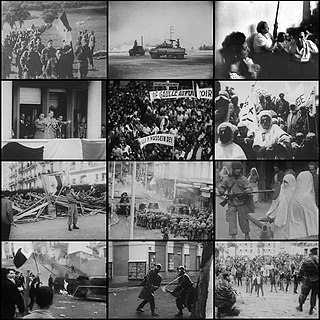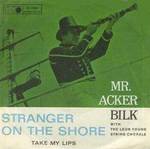Related Research Articles

In the administrative divisions of France, the department is one of the three levels of government under the national level, between the administrative regions and the communes. 96 departments are in metropolitan France, with an additional five constituting overseas departments, which are also classified as overseas regions. Departments are further subdivided into 333 arrondissements and 2,054 cantons. These last two levels of government have no political autonomy, instead serving as the administrative basis for the local organisation of police, fire departments as well as, in certain cases, elections.

The Algerian War was a major armed conflict between France and the Algerian National Liberation Front from 1954 to 1962, which led to Algeria winning its independence from France. An important decolonization war, it was a complex conflict characterized by guerrilla warfare and war crimes. The conflict also became a civil war between the different communities and within the communities. The war took place mainly on the territory of Algeria, with repercussions in metropolitan France.

Worldwide, the British rock band the Beatles released 12 studio albums, 5 live albums, 51 compilation albums, 36 extended plays (EPs), 63 singles, 17 box sets, 22 video albums and 53 music videos. In their native United Kingdom, during their active existence as a band, they released 12 studio albums, 1 compilation album, 13 EPs, and 22 singles. The early albums and singles released from 1962 to March 1968 were originally on Parlophone, and their albums and singles from August 1968 to 1970 were on their subsidiary label Apple. Their output also includes vault items, remixed mash-ups and anniversary box-sets.

The Fifth Republic is France's current republican system of government. It was established on 4 October 1958 by Charles de Gaulle under the Constitution of the Fifth Republic.

The National Assembly is the lower house of the bicameral French Parliament under the Fifth Republic, the upper house being the Senate. The National Assembly's legislators are known as députés, meaning "delegate" or "envoy" in English; etymologically, it is a cognate of the English word deputy, which is the standard term for legislators in many parliamentary systems).

"Stranger on the Shore" is a piece for clarinet written by Acker Bilk for his young daughter and originally named "Jenny" after her. The tune was written on a single scrap of paper by Bilk and handed over to Leon Young (1916-1991) who crafted the string arrangement, including the characteristic harmonic shifts at the very end.
A cabinet reshuffle or shuffle occurs when a head of government rotates or changes the composition of ministers in their cabinet, or when the Head of State changes the head of government and a number of ministers. They are more common in parliamentary systems than in systems where cabinet heads must be confirmed by a separate legislative body, and occur frequently in autocratic systems without suitable checks-and-balances.
"Buttons and Bows" is a popular song with music written by Jay Livingston and lyrics by Ray Evans. The song was published on February 25, 1948 by Famous Music Corp., New York. The song was written for and appeared in the Bob Hope and Jane Russell film The Paleface and won the Academy Award for Best Original Song. It was originally written with an Indian theme, but was changed when the director said that would not work in the movie. It was a vocal selection on many radio programs in late 1948. It was reprised in the sequel, Son of Paleface, by Roy Rogers, Jane Russell and Bob Hope. In 2004 it finished #87 in AFI's 100 Years...100 Songs survey of the top tunes in American cinema.

The 1962 Tour de France was the 49th edition of the Tour de France, one of cycling's Grand Tours. The 4,274-kilometre (2,656 mi) race consisted of 22 stages, including two split stages, starting in Nancy on 24 June and finishing at the Parc des Princes in Paris on 15 July. There were four time trial stages and no rest days. After more than 30 years, the Tour was again contested by trade teams instead of national teams. Jacques Anquetil of the Saint-Raphaël–Helyett–Hutchinson team won the overall general classification, defending his title to win his third Tour de France. Jef Planckaert (Flandria–Faema–Clément) placed second, 4 min 59 s in arrears, and Raymond Poulidor (Mercier–BP–Hutchinson) was third, over ten minutes behind Anquetil.

"Ramblin' Rose" is a 1962 popular torch song written by brothers Noel Sherman (words) and Joe Sherman (music) and popularized by Nat King Cole. The recording by Nat King Cole reached No. 2 on the Billboard Hot 100 chart in 1962.

"Break It to Me Gently" is a pop song written by blues musician Joe Seneca with lyrics by Diane Lampert. Both Brenda Lee and Juice Newton met with considerable success with their versions of the song.

"The Next Time" backed with "Bachelor Boy" was the first of three number one hit singles from the Cliff Richard musical, Summer Holiday. Both sides were marketed as songs with chart potential, and the release is viewed retroactively as a double A-side single. However, technically double A-sides were not regarded as such until 1965, so "The Next Time" was pressed as the A-side, with "Bachelor Boy" the B-side. The song was succeeded at number one by The Shadows' "Dance On!".
Since 1990, the biggest events in men's tennis have been the four Grand Slam tournaments, the ATP Finals and the ATP Masters tournaments, in addition to the Grand Slam Cup between 1990–99. From 1983 to 1990, men's tennis had a very strong tradition and clear hierarchy of tournaments: the Grand Slam tournaments, including Wimbledon, the US Open, the French Open, and the Australian Open; the season-ending Masters Grand Prix; and the Davis Cup. Before 1983, however, and in particular before the start of the Open Era in 1968, the hierarchy of professional tournaments changed virtually every year. For example, in 1934, the U.S. Pro was a high-class tournament with all the best players, but just two years later, the same tournament was ordinary because only professional teachers entered the event.

"The Young Ones" is a single by Cliff Richard and the Shadows. The song, written by Sid Tepper and Roy C. Bennett, is the title song to the 1961 film The Young Ones and its soundtrack album.

"Let's Twist Again" is a song written by Kal Mann and Dave Appell, and released as a single by Chubby Checker. One of the biggest hit singles of 1961, it reached No.8 on the U.S. Billboard pop chart in August of that year and subsequently reached No.2 in the UK in the spring of 1962. The song refers to the Twist dance craze and Checker's 1960 single "The Twist", a two-time U.S. No.1 single.
"The House of the Rising Sun" is a traditional folk song, sometimes called "Rising Sun Blues". It tells of a person's life gone wrong in the city of New Orleans. Many versions also urge a sibling or parents and children to avoid the same fate. The most successful commercial version, recorded in 1964 by the British rock band The Animals, was a number one hit on the UK Singles Chart and in the US and Canada. As a traditional folk song recorded by an electric rock band, it has been described as the "first folk rock hit".
Toussaint Rouge, also known as Toussaint Sanglante is a series of 70 attacks committed by militant members of the Algerian National Liberation Front (FLN) that took place on 1 November 1954—the Catholic festival of All Saints' Day—in French Algeria. It is usually taken as the starting date for the Algerian War which lasted until 1962 and led to Algerian independence from France.
References
- ↑ Archives on "InfoDisc" site Archived 2010-01-07 at the Wayback Machine